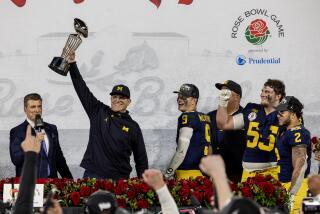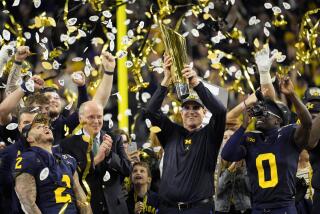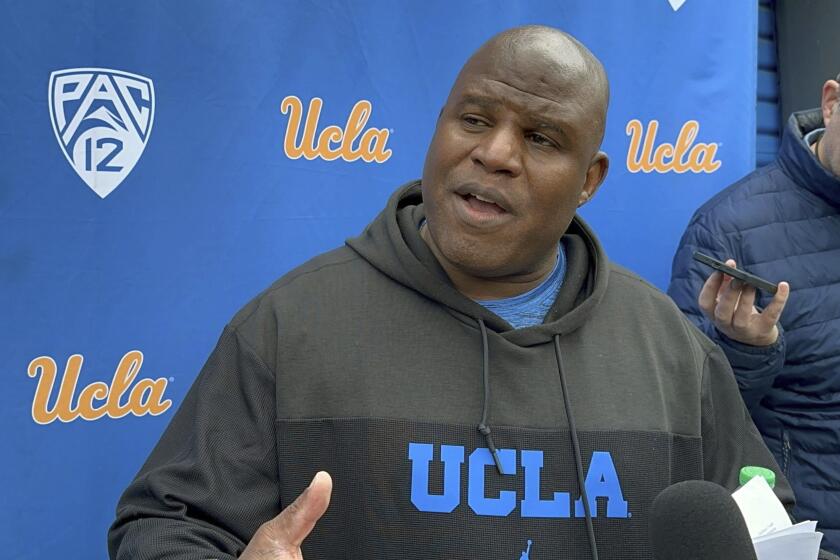Column: College football enters a new playoff world
It took a hundred years, but college football finally caved to the faucet drip of public persistence by agreeing to stage a four-team playoff starting this season.
Fare thee well to mythical champions crowned by wire services, matrices and wing nuts.
The good news is every team that ever won a Helms Athletic Foundation national title — Georgia Tech, 1928 — can keep a spit-shine on that trophy.
The benefit of not having a playoff, of course, was some years it seemed like youth soccer, where every kid gets a participation ribbon.
It was a system in which Ohio State could cherish the Associated Press trophy in 1954 as much as UCLA coveted the coaches’ 1954 crown.
Even as this hatch of history closes, Auburn scours to make retroactive claims to corner grocery stores that may have voted War Eagle at No.1 in a final straw poll.
Gone now, presumably, will be ridiculously unresolved seasons capped by screaming matches passed down through generations.
Alabama still can’t fathom Notre Dame winning the 1966 title and USC still can’t believe it shares 1979 with Alabama when the Trojans that year defeated the Crimson Tide.
Top-ranked Michigan ran out of the 1998 Rose Bowl holding up a No.1 finger but then considered flipping the next finger over when the coaches pulled a fast one and voted Nebraska a half share.
It made for great chair-tipping arguments, but so does “The Jerry Springer Show.”
Getting to the playoff was a slog spike-stripped mostly by bowl contracts that prevented the top teams, other than randomly, from meeting in a 1-2 matchup.
While the NBA and Major League Baseball expanded their postseasons almost hourly, college football needed to be shocked by cattle prod.
The seeds of playoff sprouted in 1997, when the Rose Bowl was taken to a dark alley and urged to release the Pacific 10 and/or Big Ten champion to an independent title game (to be determined by a rankings system).
The Bowl Championship Series worked out terrifically, mostly for the Southeastern Conference, which devised the system and won nine of its 16 titles. The Rose Bowl lost power and prestige — but got to keep its parade.
The BCS system was a tangled, contorted mess tweaked almost annually. It was reviled but also singularly responsible for transforming the sport from a regional to a national game. It made people in Tuscaloosa have to care about a game in Eugene.
Under the BCS banner, college football became more popular than any other sport except the NFL. Yet it ultimately collapsed, after 16 years, under its own bloated weight.
The new, four-team playoff is already better because ... what could be worse?
Leaders entrusted to protect the game swear the playoff will not morph into a March Madness-type format that becomes so large the President of the United States fills out a bracket for ESPN.
It would be cannibalism to encroach on college football’s spectacular, every-game-counts, regular season.
“There is a tipping point beyond which the regular season begins to become diminished,” Bill Hancock, executive director of the new College Football Playoff, said in a Friday phone interview. “None of us knows where that is. We’re taking a leap of faith with four.”
The deal-makers have locked in on a 12-year contract with ESPN that sounds, at least in theory, hermetically sealed.
So, naturally, everyone wants to know how many months the four-team playoff will actually last.
“I’m excited about it,” Washington State quarterback Connor Halliday said at Pac-12 media day last month. “I think by the end of it, it will go to an eight-team playoff.”
Utah Coach Kyle Whittingham agreed.
“I think it’s the tip of the iceberg,” he said. “I think you’ll see it expand.”
Wait …did they not get the memo?
Never mind that Hancock once directed the NCAA basketball tournament and that the major bowls are starting to get that homogenized, standardized look.
Hancock says, in fact, working the basketball tournament makes him more sensitive to not messing with football. He firsthand witnessed how much basketball’s season became back-end diminished by the three-week tournament.
“You can’t take that chance,” Hancock said about football. “You can’t experiment with this. You can’t say, ‘Let’s try 16 and see if it works.’”
So, here we go, into the Great Wide Open.
The playoff positives clearly outweigh what’s been shoveled to us so far.
Four teams, not two, now get to compete for the championship — that’s good. The Cotton and Peach bowls have been promoted to give us six major bowls to annually rotate the semifinal games.
The Rose and Sugar bowls will host the first semifinal games this year, followed by the Orange and Cotton and then Peach and Fiesta in 2016.
The first three national title games are set for AT&T Stadium in Texas, followed by Arizona’s University of Phoenix Stadium and then Raymond James Stadium in Tampa, Fla.
Unlike in the sprawled-out BCS system, the major bowl games will be redirected back toward their traditional windows on New Year’s Eve or New Year’s Day.
The Rose keeps its traditional Jan. 1 spot and will always be followed by the Sugar. The bad news is the Rose Bowl probably will not host a national title game in the 12-year cycle. It’s simply too difficult to get a unified bid, in a fractious city, that can match the cookies and freebies places like Tampa can offer.
When not hosting a semifinal, though, the Rose is guaranteed a Pac-12/Big Ten game even if one or both champions are lost to the playoff.
In years when the Rose is hosting a semifinal, the Pac-12 and/or Big Ten champion, unless playoff-bound, will be shipped to another major bowl.
Example: If the Pac-12 champion is not involved in the playoff this year, it will go to the Fiesta Bowl.
Playoff teams will be chosen by a 13-member committee, which will also seed the schools and assign other teams to major bowls.
The committee will release a weekly top-25 poll beginning in October, dangerous in that it puts down a template for fans. But the alternative was doing nothing.
“Fans want to know where their teams stack up,” Hancock said. “”We didn’t just want to drop four teams out of the sky.”
In fact, the best part of the BCS era was the puzzling standings that kept fans riveted for seven weeks.
The new playoff knocks traditional polls sideways toward oblivion. Hancock says the committee has been instructed to “discredit” the preseason Associated Press and USA Today coaches’ polls. Those polls can be considered after a few actual games have been played.
“I’m very curious to see how much attention fans pay to the polls,” Hancock said. “I’m assuming many fans will still pay attention to every ranking. They want to find one that says their team is seven or eight. They want a second opinion.”
The AP index, which started in 1936, will still crown an independent champion, yet it’s hard to imagine it would be different from the winner of a four-team playoff.
The playoff isn’t perfect and it certainly won’t end the controversy. Every year, the committee will leave behind a No. 5 team that could have won the national title.
Hancock insists, though, that perennial controversy will not budge the playoff off its four-team line.
“I don’t think clamor will matter,” he said. “We know there’s going to be clamor. We know team five will be very disappointed. We accept that.”
The playoff is not good news for schools outside the Power Five conferences — but they already knew that. Boise State (Mountain West) and Central Florida (American Athletic) will have a tougher time cracking the four as schools from power conferences look to upgrade their nonconference schedules (it’s already happening) to impress in the committee.
The best “Group of Five” conference champion, as determined by the committee, will at least earn a guaranteed spot into a major bowl.
It’s also not right the SEC gets to play an eight-game schedule, in a 14-team league, while the Pac-12 plays nine in 12. Or that the Big 12 is the only Power Five league that doesn’t play a championship game.
Hancock said the committee will sort out any inconsistencies. “The charge is easy. Look at the full body of work over 12 games.”
Exit question: Will this work?
Exit answer: Who knows? But it used to be worse.
Twitter: @dufresnelatimes
More to Read
Go beyond the scoreboard
Get the latest on L.A.'s teams in the daily Sports Report newsletter.
You may occasionally receive promotional content from the Los Angeles Times.







